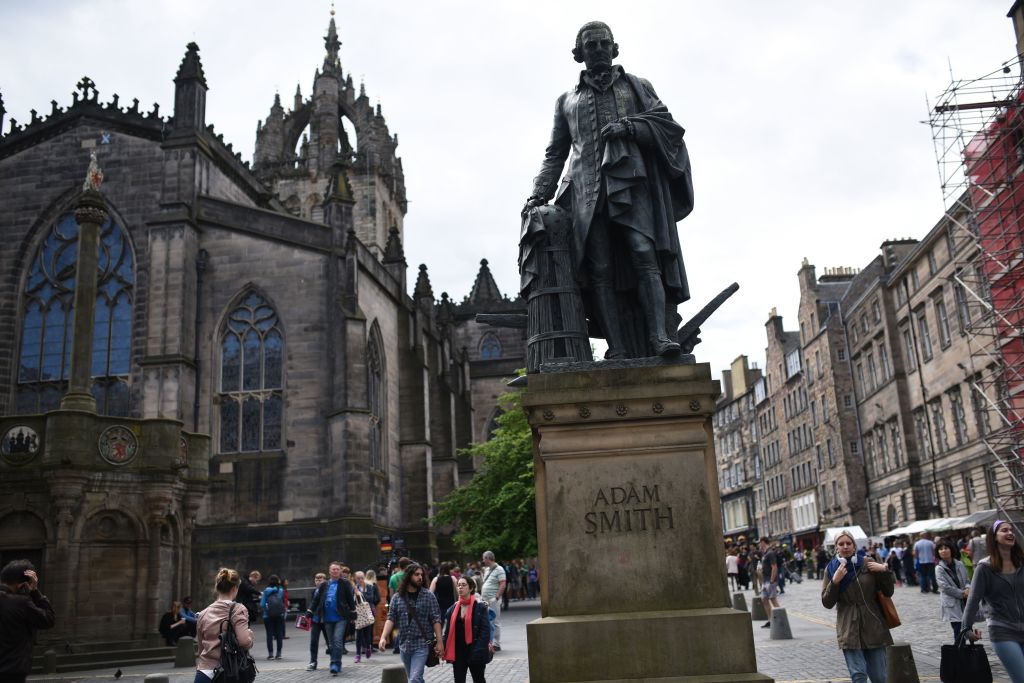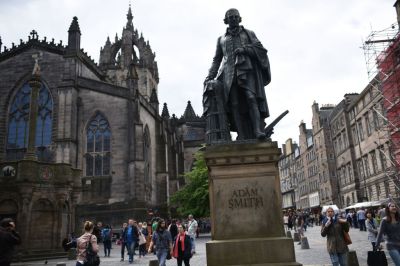EDINBURGH, Scotland—Philosopher Adam Smith was born 301 years ago this week just north of here, dying here 67 years later. And perhaps more than any other Enlightenment thinker, the world is still wrestling very much with his work.
Smith often gets the credit (or blame) for the invention of capitalism, an economic system we are now told is in its “late stage.” But, of course, Smith did not invent capitalism. He observed and described it as a condition of human nature. There is no “late stage” because, like other parts of our condition—association, kinship, factionalism, worship, etc.—it may take different forms, but it never ages, never dies.
We didn't get the word “capitalism” its current usage until 80 years or so after Smith's famous treatise, An Inquiry into the Nature and Causes of the Wealth of Nations, but the work and its description of why countries that allowed fewer restrictions on commerce were more prosperous was one of the three earthquakes that shook the Western world in 1776, and was very much related to the other two: the founding of the United States of America and the first commercial use of the steam engine invented by another Scot, James Watt.
You may walk a well-worn path to Smith’s grave in a churchyard here to pay your respects, or shoulder in for a selfie with his statue on the Royal Mile, just down the hill from that of the other twin titan of the Scottish Enlightenment, David Hume. You might still visit a tavern in a cave where Smith and the members of his Oyster Club ate, drank, and argued.
But the best monuments to Smith are the people of Edinburgh. Here on the wind-blown Firth of Forth and amid the medieval stone buildings, you will find the whole world: Residents and visitors from every corner of the planet, Asian immigrants selling authentic Highland woolens and tartan cloth, descendants of ancient Scot clans hawking made-in-China tchotchkes to tourists. Stop by the Starbucks near the 12th-century cathedral and hear the cacophony of languages, the speakers of which all somehow know the difference between a flat white from Australia, a Frappucino from the United States, a latte from Italy, and a matcha from Japan.
They are not here to venerate Smith, and many have never heard his name. But he would know why they have come jostling to this place.
Smith’s most famous work was something of a follow-up to his first major treatise, 1759’s The Theory of Moral Sentiments, which was itself a quantum leap forward in philosophy. Hume had a decade prior been working within the old idea that humans had an innate “moral sense,” an organ that calibrated moral reactions in the same way that the body’s physical senses responded to temperature, pain, pleasure, etc. Smith, though, observed that morals change among social groups and within social groups depending on circumstances. The same person at various points in his or her life might find the same conduct acceptable or odious depending on the context.
He believed what he called “sympathy” was the key. Our moral imaginations allow us to put ourselves in the places of others and our perceptions allow us to sense how our actions are perceived by them. And that trips up our own selfish desires, because among the many wants with which our species is afflicted is the craving to be esteemed. That tension between self-interest narrowly defined and self-interested pursuit of the admiration of others is where we get Smith’s famous “invisible hand.” But its object is not profit for its own sake.
“Man naturally desires,” he wrote, “not only to be loved, but to be lovely.”
It might be rational to lie, cheat, and steal in a Darwinian quest for resources, but what about love? Since the ancients, we have known that humans crave to give and receive it. Indeed, our quest for love in all its forms has been the axis on which much of human existence has turned. Later philosophers would call it a rational choice, which is true only in the context Smith observed. The rational decisions we make in our moral lives are rooted in our desire to receive and give something beyond reason: love.
There might not be a moral organ, as Hume and the ancients believed, but there has always been an in-born craving that would have been well known to the churchman Smith: to be known and loved. And that desire jostles with the other human needs and can help people find their way into community with each other and regulate their actions within it.
It was a short jump then to conclude that if a government were to protect its citizens from the abuses of each other—crime, enslavement, oppression—that these love-loving humans would readily arrange themselves around good things.
Humans are dangerous, no doubt, capable of the worst brutalities imaginable. And we are greedy, too. But we are greedy for good things as well as the bad.
And what has brought the world to the feet of Adam Smith’s statue and sends its denizens strolling unwittingly past his grave, iced caramel macchiatos in hand, is the quest for something lovely. Families travel the world, shopkeepers sell their wares, local kids treat passers-by to The Weeknd's “Blinding Lights” on bagpipes not to simply meet material needs, but to make themselves more lovely to the people in their lives, and sometimes even strangers.
Smith did not invent an economic system, he observed a durable part of human nature and used it to explain the remarkable successes that people produce when left to their own devices and why directing their activities to a predetermined goal always seems to fail.
Greed itself is not good, but greed for good can bring the world to Edinburgh and Edinburgh to the world.







Please note that we at The Dispatch hold ourselves, our work, and our commenters to a higher standard than other places on the internet. We welcome comments that foster genuine debate or discussion—including comments critical of us or our work—but responses that include ad hominem attacks on fellow Dispatch members or are intended to stoke fear and anger may be moderated.
With your membership, you only have the ability to comment on The Morning Dispatch articles. Consider upgrading to join the conversation everywhere.